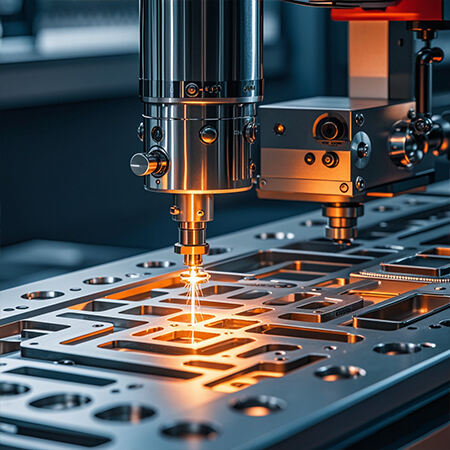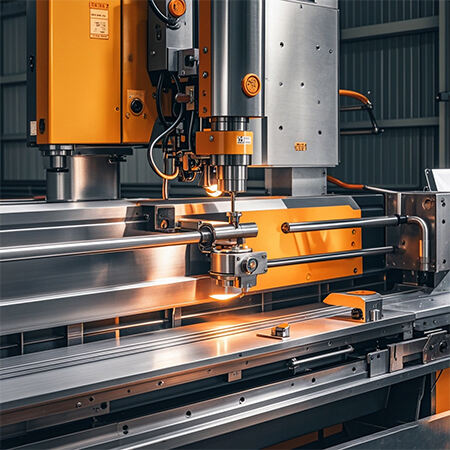الممارسات المستدامة في تصنيع ألواح المعدن: التركيز الرئيسي في عام 2025 لخفض النفايات والبصمة الكربونية
يناير 2025 - في الدفع العالمي المستمر نحو الاستدامة، تكثف صناعة تصنيع ألواح المعدن جهودها لتقليل النفايات وتقليل البصمة الكربونية. مع وجود مخاوف بيئية في المقدمة، يعتمد المزيد من الصانعين ممارسات مبتكرة لتقليل هدر المواد، وتحسين كفاءة الطاقة، وتبني عمليات إنتاج صديقة للبيئة.
تعتبر صناعة تصنيع ألواح المعدن، التي تعتبر أساسية للصناعات مثل السيارات والطيران والبناء، معروفة منذ فترة طويلة بسبب تأثيرها البيئي الكبير. ومع ذلك، في عام 2025، تخضع للتحول حيث تقوم الشركات بدمج تقنيات خضراء، وممارسات تصنيع أذكى، وتصاميم تركز على الاستدامة لتخفيف بصمتها البيئية.
تقليل الهدر من خلال استخدام مواد متقدمة
إحدى الاستراتيجيات الرئيسية لتقليل النفايات في تصنيع المعادن المفلطحة كانت تعزيز استخدام المواد بكفاءة. من خلال استخدام البرمجيات المتقدمة مثل التصميم المساعد بالحاسوب (CAD) والتصنيع المساعد بالحاسوب (CAM)، يمكن للمصنعين الآن تخطيط أنماط القطع بدقة، مما يؤدي إلى تقليل فاقد المواد بشكل كبير. يشير الخبراء إلى أن تقنيات التحسين الجديدة لترتيب القطع يمكن أن تقلل من هدر المواد بنسبة تصل إلى 25%، مما يساهم مباشرة في خفض التكاليف وتأثير البيئة.
قال ديفيد جونسون، المدير التنفيذي للعمليات في واحدة من أكبر شركات تصنيع المعادن: "لقد شهدنا تحسينات كبيرة في كفاءة استخدام المواد بفضل أنظمة CAD/CAM الحديثة". "ما كان يعتبر فاقداً لا مفر منه في الماضي يتم القضاء عليه الآن من خلال التخطيط والتكنولوجيا الأفضل"

تُصبح إعادة التدوير والاستخدام من جديد في مركز الاهتمام
بالإضافة إلى الاستفادة الأفضل من المواد، أصبحت إعادة التدوير تركيزًا رئيسيًا بشكل متزايد. يُفيد القادة في الصناعة أن حوالي 80٪ من مخلفات المعادن الناتجة أثناء الإنتاج يتم إعادة تدويرها واستخدامها الآن في عملية التصنيع. تعتبر المعادن مثل الألمنيوم والفولاذ، التي يمكن إعادة تدويرها بسهولة، محورية بشكل خاص لجهود الاستدامة. إعادة استخدام المخلفات تقلل من الحاجة إلى المواد الخام الجديدة، مما يوفر الطاقة والمصادر الطبيعية.
في عام 2025، ذهبت بعض الشركات خطوة أبعد من خلال تبني أنظمة إعادة تدوير دائرية، حيث يتم جمع مخلفات المعادن، وإذابتها، وإعادة تشكيلها إلى ألواح جديدة، مما يقلل من النفايات واستهلاك الطاقة. هذا النهج الابتكاري يساعد الشركات على تقليل بصمتها الكربونية بشكل كبير، مساهمًا في الاقتصاد الدائري.
عمليات التصنيع الموفرة للطاقة
تظل استهلاك الطاقة أحد أكبر المساهمين في انبعاثات غازات الدفيئة في صناعة المعادن المفلطحة. لمعالجة هذا، يتجه المزيد من الصانعين نحو تكنولوجيات توفير الطاقة. قص الليزر، وقص النفاث المائي، والأدوات الدقيقة الأخرى ليست فقط أكثر دقة ولكنها أيضاً تستهلك طاقة أقل مقارنة بالطرق التقليدية.
بالإضافة إلى ذلك، فإن العديد من الصانعين ينتقلون إلى مصادر الطاقة المتجددة لتزويد عملياتهم بالطاقة. أصبحت تركيبات الطاقة الشمسية وطاقة الرياح الآن مشاهد شائعة في العديد من مصانع إنتاج المعادن المفلطحة، مما يقلل بشكل أكبر من انبعاثات الكربون لديهم. وفقًا للبيانات الصناعية، نجحت الشركات التي تستخدم مصادر الطاقة المتجددة في تقليل انبعاثات الكربون بنسبة تصل إلى 40% خلال الخمس سنوات الماضية.
«قدمنا الطاقة الشمسية لتشغيل عملياتنا، وكانت النتائج مذهلة»، قالت كلارا مartinez، مديرة الاستدامة في شركة عالمية لتصنيع المعادن الورقية. «لست نحن فقط نقلل من الانبعاثات، ولكننا أيضًا نلاحظ توفير تكاليف طويل الأجل يجعل عملياتنا أكثر استدامة اقتصادية».
تصميم من أجل الاستدامة: تحول جذري
تُدمَج مبادئ التصميم المستدام بشكل متزايد في مرحلة تطوير المنتج. يعمل المصممون عن كثب مع المصنعين لإنشاء منتجات أسهل في إعادة التدوير وتستخدم موارد أقل أثناء الإنتاج. أصبحت مبادئ تصميم التصنيع والتجميع (DFMA)، التي تركز على تبسيط التصاميم لتحقيق إنتاج أسرع وأكثر كفاءة، الآن ممارسة قياسية عبر الصناعة.
بالإضافة إلى ذلك، يركز مصنعو المعادن المفلطحة على العمر الطويل والمتانة في تصميم منتجاتهم لتقليل تكرار الاستبدال. هذا التحول نحو منتجات أكثر استدامة يقلل من النفايات الإنتاجية والتأثير البيئي عند نهاية عمر المنتج.
الالتزام بالشهادات والمعايير
مع أصبح الاستدامة جزءًا أساسيًا من استراتيجية الشركات، يسعى العديد من مصنعي المعادن المفلطحة للحصول على شهادات خضراء والامتثال للمعايير البيئية. يتبنى القادة في الصناعة بشكل متزايد نظام إدارة البيئة ISO 14001 ونظام إدارة الطاقة ISO 50001 لتوثيق وتحسين ممارساتهم المستدامة باستمرار. تساعدهم هذه الشهادات على تقليل تأثيرهم البيئي بينما تلتزم بأعلى المعايير العالمية للأداء البيئي.

الطريق إلى الأمام: مستقبل أGreener لصناعة المعادن المفلطحة
في المستقبل، من المتوقع أن تصبح الاستدامة في تصنيع المعادن المفلطحة أكثر بروزًا. يحمل دمج التكنولوجيات الناشئة مثل الذكاء الاصطناعي والطباعة ثلاثية الأبعاد وعودًا لخفض النفايات وتحسين كفاءة الطاقة بشكل أكبر. كما تقوم الشركات باستكشاف إمكانات البلاستيك الحيوي及其他 المواد البديلة التي يمكن أن تقلل بشكل أكبر من التأثير البيئي لعمليات التصنيع.
مع تكيف الصناعة مع متطلبات مستقبل أكثر خضرة، من الواضح أن الممارسات المستدامة في تصنيع المعادن المفلطحة ليست مجرد اتجاه، بل ضرورة. في عام 2025، فإن التحول نحو تقليل النفايات وتقليل انبعاثات الكربون واستخدام الموارد بشكل مسؤول ليس فقط يساعد الشركات على تحسين مكانتها البيئية، ولكن أيضًا يمنحها ميزة تنافسية في سوق يزداد وعيًا بالبيئة.
نقطة تحول للصناعة
يُشير النمو المستمر لممارسات الاستدامة في تصنيع المعادن إلى نقطة تحول كبيرة للصناعة. بينما تتبني الشركات طرق إنتاج أكثر كفاءة، وتزيد من إعادة تدوير المواد وتقليل استهلاك الطاقة، يصبح الطريق نحو مستقبل أخضر وأكثر استدامة واضحًا بشكل متزايد. بحلول عام 2030، يتوقع الخبراء أن هذه الجهود ستحول بشكل كبير شكل القطاع، مما يساهم في تحقيق منظر صناعي عالمي أكثر استدامة.
حتى الآن، يمثل عام 2025 علامة فارقة لصانعي المعادن الملتزمين بتقليل الهدر وتقليل بصمتهم الكربونية وتعزيز الممارسات المسؤولة بيئيًا، مما يضمن مستقبلًا أكثر استدامة لكوكبنا والصناعة على حد سواء.


